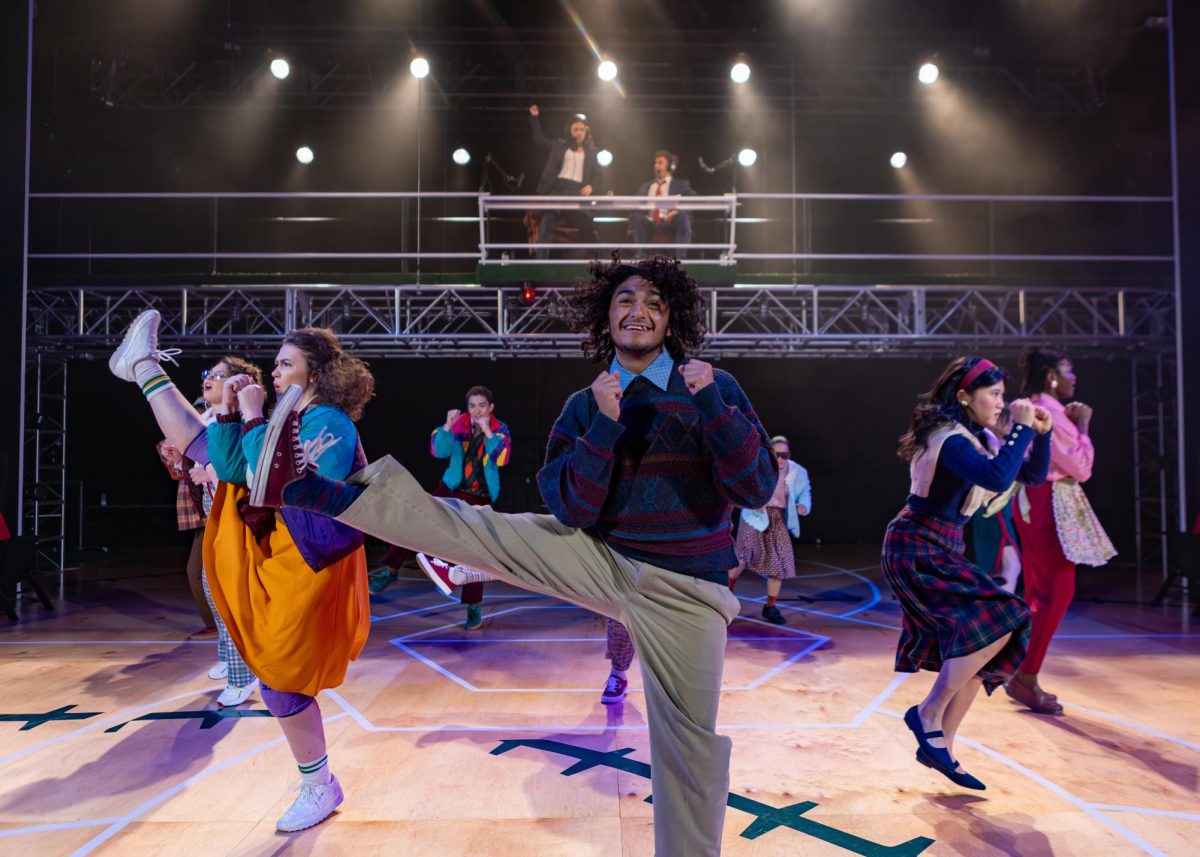The holidays can be stressful, especially when they involve extended family. Which aunt has a grudge against which uncle? Which of my siblings is on a gluten-free diet now? How is everyone going to fit in sitting at one table? God forbid we have to pull out the card table for the kids!
Texas Theater and Dance tries to answer all those questions – and many more – with the opening show of its 2024-2025 season, “A Beautiful Day in November on the Banks of the Greatest of the Great Lakes,” a comedy playing on the “athleticism” that goes into planning a holiday like Thanksgiving.
The play by New York-based playwright Kate Benson premiered Off-Broadway in 2015, and Caley Chase, a theater MFA candidate in her third year, is directing UT’s production.
The play follows the Wembly family preparing for their annual Thanksgiving dinner. Two sports commentators, played by sophomore Natalie Tran and senior Jake Wilson, sit above the stage throughout the show, commenting on the play’s action like they would a game. The stage was reminiscent of a gym’s floor, and the lighting looked like the harsh lights in a high school gym.
The Wembly family’s staging was abstract and extremely movement-based. There was no distinct geography within the home portrayed by the actors’ staging, and the audience had to listen to the commentators carefully to understand the specifics of what was happening. Even as a theater major, it took me about a third of the way through to understand the connection between the almost dance-like movement and the commentator’s words. I imagine it would be confusing for someone without the same theater experience to pick up on this.
While Tran’s and Wilson’s characters drive the play from the start, the audience slowly meets the Wembly family in their eclectic forms as they arrive for dinner. The family spans at least three generations, with GrandDada and Snapdragon being the oldest and Gumbo being the youngest. Weirdly enough, none of the characters had “normal” names and were almost exclusively named after foods.
Cherry Pie (junior Esmeralda Treviño), Trifle (sophomore Oyin Ojomo) and Cheesecake (sophomore Emerson Hartman) are Snapdragon and GrandDada’s three daughters tasked with executing this year’s celebration. Each of the three actresses gave their all on stage, but Ojomo stood out with her expressive physicality throughout. However, it was often difficult to understand the relationship between the three characters – similar to the staging, I didn’t immediately make the connection that these characters were sisters.
A few actors played multiple roles, and though minor costume changes helped to denote the character shifts, the fast-paced action of the show, mixed with the confusing staging, made it a little hard for me to follow when an actor was playing one of their many roles.
That being said, the play kept me entertained the entire time. The characters’ movement allowed for hilarious moments when accompanied by the commentary from Tran and Wilson. Sophomore Jax Schuck provided live sound effects for the production, complementing the staging and the play’s comedy. The production also used video projections to highlight certain moments, especially with the commentators.
Benson’s writing and the students’ performances gave me an enjoyable night at the theater, and the show’s complexity and novelty should be expected from any of Texas Theater and Dance’s performances. If you’re interested in a play with relatable characters and abstract staging, this show is for you. If you like new and interesting art that talks about family traditions, you will be delighted and engaged. However, the show’s more complex aspects may leave the average theatergoer confused about the story’s direction because of the reliance on the commentators’ words to explain the staging and the lack of a clear sense of space in the Wembley home.
Aaron is a journalism and theater junior from Bastrop, Texas. “A Beautiful Day in November on the Banks of the Greatest of the Great Lakes” has four more performances in the F. L. Winship Drama Building between Oct. 16-20. The show runs approximately 80 minutes without an intermission. Tickets cost $15 for UT students, $21 for faculty and staff, and $26 for the general public.































